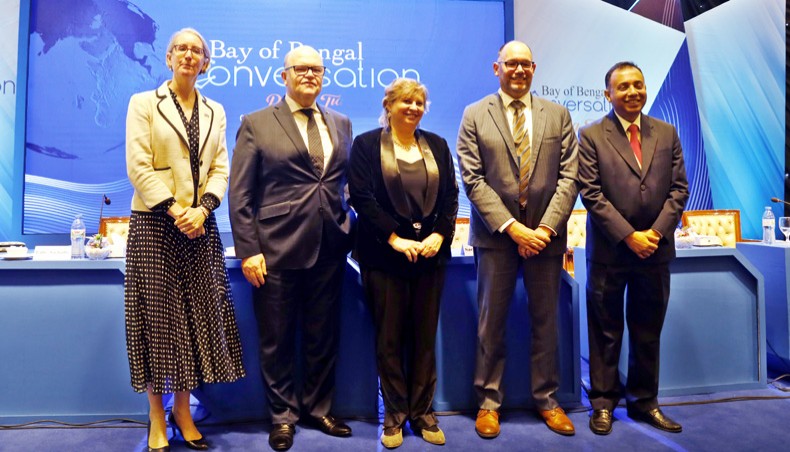Bay of Bengal Conversation ends with call for open Indo-Pacific region

The Bay of Bengal Conversation 2023 concluded in Dhaka on Monday, calling to promote democratic values, human rights, and more space for critics and to keep the Indo-Pacific Region free, open, peaceful, and secure.
In the three-day event, scholars, researchers, foreign diplomats, journalists, and members of civil society explored ways to find more space for democracy and discussed global crises and their ramifications at the regional level.
The Centre for Governance Studies, a non-government think tank, organised the geopolitical conference for the second year in Dhaka, connecting global and local leaders.
Addressing a panel titled ‘Defining Competition in the Indo-Pacific’, the United States ambassador, Peter Haas, said that in his view, ‘competition’ in the Indo-Pacific was not about forcing countries to choose; rather, it was about offering an alternative vision based on respect, prosperity, and partnership.
He said that human rights and democracy were not at all tooled to dominate the region.
‘As liberal democracies, our approaches also recognise the importance of human rights to safeguard peace and prosperity in the Indo-Pacific,’ he said.
The US ambassador believed that China’s Belt and Road Initiative and maritime ambitions had signalled new dynamics in this region.
‘And this brings us to the most pressing strategic challenge to our vision of a free and open Indo-Pacific: authoritarian powers trying to alter the fundamental rules of the road in international affairs,’ he said.
‘We do not seek conflict. We do not seek a Cold War. Let me repeat, we do not seek a Cold War.
‘But we will be unabashed in promoting our vision of a free, open, secure, and prosperous world and what we have to offer communities of nations.’
Echoing similar, British High Commissioner to Bangladesh Sarah Cooke said, ‘We are committed to supporting a free and open Indo-Pacific, where sovereignty and territorial integrity are respected and states can make choices free from coercion, disinformation, and interference.’
‘Ambitious and effective partnerships are key to achieving our objectives, and we are prioritising working with and through regional partners and institutions in the Indo-Pacific.’
‘And the UK shares a similar vision to Bangladesh for the Indo-Pacific,’ she said.
The British envoy said that the UK’s vision is for a free and open Indo-Pacific, a region that is ‘secure and stable, enabling prosperity and sustainable economic growth.’
Jeremy Bruer, Australian High Commissioner to Bangladesh, and Lilly Nicholls, Canadian High Commissioner to Bangladesh, also attended the session moderated by Zillur Rahman, chairman of the Bay of Bengal Conversation.
In a plenary session later, Wu Lin, an associate professor at China Foreign Affairs University in China, argued that the BRI had attained success around the world via development partnerships.
She said that a focus on the standard of living is necessary, and stakeholders must come together to foster healthy development through partnerships.
‘Bangladesh must also rely on such cooperation.’
In the last plenary session titled ‘The Dragon’s Domain: BRI after a Decade,’ Ali Riaz, a distinguished professor at Illinois State University, said BRI came as the apparatus of a ‘new kind of imperialism’.
Yoshikazu Kato, a research fellow at the Rakuten Securities Economic Research Institute, in Japan, said Japan did not acknowledge the BRI.
But if it can ensure cooperation and development, Japan might join, he added.
News Courtesy:
